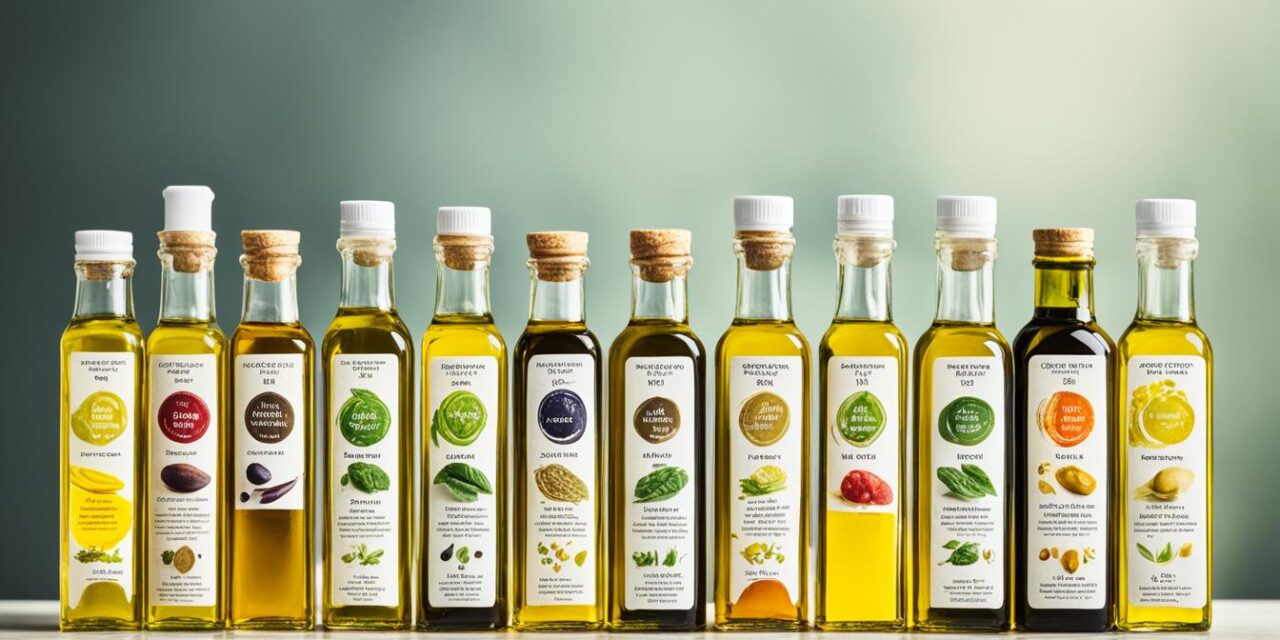Did you know that the cooking oil you choose can have a significant impact on your health? It’s true! The type of oil you use in your kitchen can affect your heart health, nutrient absorption, and overall well-being. Whether you’re frying, roasting, or sautéing, selecting the right cooking oil is essential for promoting a healthier lifestyle.
Key Takeaways:
- Not all cooking oils are created equal, and some are much healthier than others.
- Heart-healthy oils like olive oil and avocado oil are excellent choices for everyday cooking.
- Unhealthy oils, such as highly refined oils and hydrogenated oils, should be avoided due to their negative impact on health.
- Consider factors like smoke point and cooking methods when selecting cooking oils.
- Include a variety of healthy fats in your overall diet for optimal nutrition.
The Best Cooking Oils for Your Health
When it comes to taking care of your health, choosing the right cooking oils can make a big difference. You want to opt for oils that not only enhance the flavors of your dishes but also provide essential nutrients and promote heart health. Here are some of the best cooking oils that offer a combination of great taste and numerous health benefits:
Olive Oil: Liquid Gold for Your Health
If you’re looking for a heart-healthy oil, look no further than olive oil. It’s bursting with monounsaturated fats, vitamin E, and polyphenol antioxidants that can support heart health and reduce the risk of heart disease. Studies have shown that diets rich in olive oil are associated with lower LDL cholesterol levels and improved blood vessel function. With its distinct flavor and versatility, olive oil is perfect for drizzling over salads, sautéing vegetables, and even baking.
Avocado Oil: Creamy Goodness with Health Benefits
Avocado oil is another fantastic choice for your heart health. Like olive oil, it is rich in monounsaturated fats that help lower LDL cholesterol levels. This creamy oil is also packed with antioxidants that combat inflammation and protect against oxidative stress. Avocado oil has a high smoke point, making it suitable for frying, grilling, and roasting. It adds a deliciously buttery and nutty flavor to your dishes, making it a versatile option for various recipes.
Sesame Oil: A Flavorful and Nutritious Option
Add an Asian twist to your cooking with sesame oil. This flavorful oil has a distinct nutty taste that can elevate any dish. Sesame oil is rich in heart-healthy fats, including monounsaturated and polyunsaturated fats. It has been shown to lower LDL cholesterol levels and promote healthy blood sugar levels. While it’s not recommended for high-heat cooking, sesame oil is perfect for stir-frying, sautéing, and adding a finishing touch to your favorite Asian-inspired dishes.
These are just a few of the best cooking oils for your health. Others worth mentioning include canola oil, corn oil, and soybean oil, which are rich in unsaturated fats and have been linked to various health benefits. Incorporating these heart-healthy oils into your cooking can not only enhance the taste of your meals but also support your overall well-being.
The Worst Cooking Oils for Your Health
While some cooking oils offer health benefits, it’s important to be aware of the worst cooking oils that can be detrimental to your health. These unhealthy cooking oils should be avoided to protect your well-being and maintain a healthy diet.
Highly Refined Oils
Highly refined oils like canola oil, corn oil, and soybean oil are often used in cooking due to their affordability and availability. However, these oils go through a refining process that strips them of beneficial compounds, such as antioxidants and nutrients. Consuming these oils in excess can contribute to inflammation and heart health issues, as they may contain high levels of omega-6 fatty acids.
Unhealthy Fats and Trans Fats
Unhealthy cooking oils often contain high levels of unhealthy fats and trans fats. Trans fats, found in hydrogenated oils like margarine and shortening, are especially harmful and have been linked to an increased risk of heart disease. These fats can raise your LDL (bad) cholesterol levels and lower your HDL (good) cholesterol levels, putting your heart health at risk.
When cooking with unhealthy oils, these harmful compounds can be absorbed by the food, resulting in a less nutritious meal. Additionally, these oils are commonly used in fried foods and processed products, which further increase their negative impact on health.
To make healthier choices in your cooking, it’s best to avoid these unhealthy oils and opt for healthier alternatives that include unrefined oils and fats.
“Choosing healthier oils for your cooking is like having a secret ingredient for better health. Say goodbye to the worst cooking oils and welcome healthier alternatives with open arms!”
Here’s a breakdown of the worst cooking oils to avoid:
| Cooking Oil | Health Concerns |
|---|---|
| Canola Oil | Highly refined; potential for inflammation and heart health issues |
| Corn Oil | Highly refined; potential for inflammation and heart health issues |
| Soybean Oil | Highly refined; potential for inflammation and heart health issues |
| Margarine | Contains trans fats; harmful to heart health |
| Shortening | Contains trans fats; harmful to heart health |
By avoiding these unhealthy oils and choosing healthier alternatives, you can take a step toward improving your overall health and well-being. Opt for oils that are less refined, such as extra virgin olive oil, avocado oil, or coconut oil, which offer a range of health benefits and can be used in a variety of cooking methods.
Importance of Smoke Point and Cooking Methods
When it comes to cooking, the type of oil you choose can make a big difference in the outcome of your dishes. It’s not just about flavor or health benefits; it’s also about the science behind smoke points and cooking methods. Understanding these factors is key to mastering the art of cooking with oils.
First, let’s talk about smoke points. The smoke point is the temperature at which an oil begins to break down and produce smoke. When oil reaches its smoke point, it starts to release harmful compounds and can create an unpleasant taste and smell in your food. To prevent this from happening, it’s important to use an oil with a smoke point that exceeds your cooking temperature.
For high-heat cooking methods like frying, searing, and roasting, you’ll want to choose oils with high smoke points. These oils can withstand the intense heat without breaking down, allowing your food to cook evenly and achieve that perfect golden brown crust. Some examples of high-heat cooking oils with their respective smoke points are:
| Oil | Smoke Point |
|---|---|
| Olive oil | 375°F (191°C) |
| Avocado oil | 520°F (271°C) |
| Canola oil | 400°F (204°C) |
| Peanut oil | 450°F (232°C) |
On the other hand, low-heat cooking methods like sautéing, simmering, and baking require oils with lower smoke points. These oils are better suited for gentle heat, allowing you to infuse flavor without reaching the smoke point. Some examples of low-heat cooking oils with their respective smoke points are:
| Oil | Smoke Point |
|---|---|
| Extra virgin olive oil | 325°F (163°C) |
| Coconut oil | 350°F (177°C) |
| Butter | 350°F (177°C) |
| Flaxseed oil | 225°F (107°C) |
It’s important to note that different oils have different smoke points due to their composition and processing methods. For example, refined oils typically have higher smoke points than their unrefined counterparts. So when choosing an oil for a specific cooking method, always consider its smoke point to avoid any undesirable outcomes.
Now that you know about smoke points, let’s talk about cooking methods. Each cooking method requires a specific oil that can withstand the heat and produce the desired results. Here are some common cooking methods and the recommended oils to use:
- Frying: For deep frying, choose oils like canola, peanut, or sunflower oil that have high smoke points and neutral flavors.
- Sautéing: Olive oil, avocado oil, or coconut oil are great choices for sautéing due to their flavor profiles and moderate smoke points.
- Baking: When it comes to baking, butter, coconut oil, or vegetable oils like canola or sunflower oil work well for most recipes.
- Grilling: Opt for oils with high smoke points like avocado oil or canola oil to handle the intense heat of grilling.
By selecting the right oil for the cooking method, you can ensure that your dishes turn out delicious, with optimal texture and flavor. So the next time you’re in the kitchen, don’t just grab any oil from your pantry. Consider the smoke point and cooking method, and choose the oil that suits your needs.
Remember, cooking with the right oil can make all the difference in elevating your culinary creations. Understanding smoke points and selecting the appropriate oil for each cooking method will help you achieve the best possible results. So go ahead and experiment with different oils, master the art of cooking, and savor the delicious flavors you create!
Tips for Choosing and Storing Cooking Oils
When it comes to selecting the right cooking oils, you need to consider a few important factors. So, you’re standing in the oil aisle, contemplating which bottle to pick. Don’t worry, we’ve got you covered with some handy tips!
1. Consider Smoke Point, Flavor, and Price
The smoke point of an oil is the temperature at which it starts to break down and produce smoke. It’s essential to choose an oil with a smoke point suitable for your cooking method. Oils with higher smoke points, like avocado oil and peanut oil, are ideal for high-heat cooking such as frying. Oils with lower smoke points, like extra virgin olive oil, are better for low-heat cooking or as finishing oils. Think about the flavors you want to infuse into your dishes and consider the price range that fits your budget.
2. Check the Quality of the Oil
Quality matters! To ensure you’re getting the best cooking oil, look for products in dark glass or opaque metal containers. This offers protection from heat, light, and oxygen, preserving the oil’s freshness and preventing it from turning rancid too quickly.
3. Opt for High-Quality Oils
While high-quality oils like extra virgin olive oil and avocado oil may be more expensive, they offer greater health benefits. These oils are generally less processed and retain more of their natural nutrients and flavors. So, it’s worth investing in these premium options when your health is at stake.
4. Store Your Oils Properly
Proper storage is key to maintaining the quality of your cooking oils. Keep them away from heat sources like stoves and direct sunlight, as exposure to heat and light can cause the oil to oxidize and degrade. Store your oils in a cool, dark place, such as a pantry or cupboard, to prolong their shelf life and preserve their nutritional content.
5. Check the “Best By” Dates
Just like any other food product, cooking oils have expiration dates. Always check the “Best By” date on the bottle to ensure that the oil is fresh and of good quality. Using expired oils can compromise the taste and health benefits of your dishes.
By keeping these tips in mind, you can make informed choices when selecting and storing your cooking oils. Remember, the right oil can elevate the flavor of your dishes while providing health benefits, so choose wisely!
| Oil | Smoke Point | Common Uses |
|---|---|---|
| Avocado Oil | 520°F | High-heat frying, sautéing, roasting |
| Olive Oil (Extra Virgin) | 320°F | Low-heat cooking, salad dressings, drizzling |
| Peanut Oil | 450°F | High-heat frying, stir-frying |
| Coconut Oil | 350°F | Baking, sautéing, popcorn popping |
| Sesame Oil | 410°F | Stir-frying, dressings, marinades |
Expert Tip:
For a healthier alternative to deep-frying, try oven-baking your favorite crispy dishes. It’s a great way to cut down on excess oil while still enjoying the irresistible crunch!
Now armed with these tips, you can confidently navigate the cooking oil aisle and choose the perfect oils for your culinary adventures. Happy cooking!
The Dangers of Unhealthy Oils
Unhealthy oils can pose significant risks to your health. Highly refined oils and hydrogenated oils, in particular, have been linked to a range of negative effects on the body. Regular consumption of these oils can lead to increased inflammation, elevated blood pressure, and unfavorable changes in cholesterol levels.
These health risks associated with unhealthy oils can ultimately contribute to the development of chronic conditions, including heart disease. It is crucial to understand the detrimental effects of bad oils on your health and take steps to limit their consumption.
“Consuming unhealthy oils regularly can have harmful consequences for your overall well-being.”
Instead of relying on unhealthy oils, it is important to opt for healthier alternatives. By choosing oils with a higher content of unsaturated fats and avoiding highly refined or hydrogenated oils, you can protect your health and well-being.
Understanding the negative effects of bad oils on your health empowers you to make informed choices about the oils you use in your daily cooking and food preparation. By prioritizing healthier alternatives, you can enjoy the culinary experience while safeguarding your overall health.
To illustrate the risks of unhealthy oils, here is a table outlining the detrimental effects on health that have been associated with their consumption:
| Health Risk | Description |
|---|---|
| Inflammation | Regular consumption of unhealthy oils can lead to chronic inflammation in the body, which is associated with an increased risk of various diseases, including heart disease, diabetes, and certain types of cancer. |
| Elevated Blood Pressure | Unhealthy oils have been linked to elevated blood pressure levels, which is a significant risk factor for heart disease and stroke. It is essential to choose oils that promote heart health and maintain optimal blood pressure. |
| Adverse Changes in Cholesterol Levels | Regular consumption of unhealthy oils can lead to unfavorable changes in cholesterol levels, specifically increasing levels of LDL cholesterol (the “bad” cholesterol) and decreasing levels of HDL cholesterol (the “good” cholesterol). This imbalance can increase the risk of heart disease. |
By being aware of the dangers of unhealthy oils and making conscious choices to avoid them, you can prioritize your health and reduce the risk of developing chronic conditions.
The Role of Fats in a Healthy Diet
Choosing healthy oils for cooking is essential, but it’s equally important to incorporate a variety of healthy fats into your overall diet. Fats play a vital role in maintaining good health and should not be demonized as they are often misunderstood. In fact, they are essential for various essential bodily functions.
Healthy fats are responsible for:
- Promoting nutrient absorption: Certain vitamins, such as vitamin A, D, E, and K, are fat-soluble, meaning they require dietary fats to be properly absorbed by the body. Including healthy fats in your meals can enhance the absorption of these important nutrients and maximize their benefits.
- Providing fuel and energy: Fats are an excellent source of energy, supplying the body with a dense source of calories. They can help sustain energy levels throughout the day and support physical performance.
- Regulating hormones: Fats are involved in the production and regulation of hormones in the body. Hormones play a crucial role in many bodily processes, including metabolism, mood regulation, and fertility.
- Promoting cell function: Fats are integral components of cell membranes and help maintain their integrity and function. They also support the development of healthy skin, hair, and nails.
While it’s true that certain fats, such as saturated and trans fats, should be limited in the diet due to their potential negative impact on health, it’s equally important to include sources of healthy fats in your meals.
Some examples of healthy fats include:
- Nuts and seeds: Walnuts, almonds, chia seeds, and flaxseeds are excellent sources of healthy fats, including omega-3 fatty acids. They can be enjoyed as a snack or added to salads, smoothies, or baked goods.
- Avocado: Avocados are rich in monounsaturated fats, which have been shown to promote heart health and reduce inflammation. Enjoy avocados sliced on toast, mashed into guacamole, or added to salads and sandwiches for a creamy, nutritious boost.
- Fatty fish: Salmon, mackerel, sardines, and trout are high in omega-3 fatty acids, which are known for their anti-inflammatory properties and benefits for heart health. Aim to include fatty fish in your diet at least twice a week.
- Healthy cooking oils: Oils such as olive oil, avocado oil, and coconut oil can be used for cooking and provide a source of healthy fats. These oils are rich in monounsaturated and polyunsaturated fats, which have been linked to numerous health benefits.
By incorporating these sources of healthy fats into your meals, you can reap their nutritional benefits and support overall health.
Including healthy fats in your diet doesn’t mean you can consume them without moderation. They are calorie-dense, so portion control is still important. Aim for a balanced diet that includes a variety of nutrient-dense foods.
Conclusion
Congratulations! You now have a clear understanding of the best and worst cooking oils for your health. When it comes to selecting cooking oils, it’s crucial to make informed choices to enhance your well-being and protect against chronic diseases.
Summary of cooking oil choices:
- Olive oil, avocado oil, and sesame oil are among the best cooking oils for your health. These oils are rich in unsaturated fats and have been linked to various health benefits.
- Highly refined oils, such as canola oil, corn oil, and soybean oil, should be avoided due to their detrimental effects on health.
- Consider factors like smoke point and cooking methods when choosing cooking oils. Different oils have different smoke points, so it’s important to match the oil with the cooking method to achieve optimal results.
- Proper storage of cooking oils is essential to maintain their quality. Choose oils packaged in dark glass or opaque metal containers and store them away from heat and light.
- Including a variety of healthy fats in your diet is important for overall health. Incorporate sources like nuts, seeds, avocados, and fatty fish into your meals for additional health benefits.
By prioritizing healthier cooking oils and including a variety of healthy fats in your diet, you can take a proactive approach to your health and well-being. Start making better choices today and reap the rewards of a healthier lifestyle.
FAQ
What are the best cooking oils for your health?
What are the worst cooking oils for your health?
How should I choose a cooking oil based on smoke point and cooking methods?
What tips can you provide for choosing and storing cooking oils?
What are the dangers of unhealthy oils?
What is the role of fats in a healthy diet?
What is the conclusion regarding cooking oil choices?
MORE SOURCES TO READ:
- https://www.health.com/best-and-worst-cooking-oils-8405160
- https://www.ndtv.com/health/this-is-undoubtedly-the-best-and-worst-cooking-oil-for-your-health-tells-our-expert-nutritionist-1973851
- https://www.aarp.org/health/healthy-living/info-2022/healthy-cooking-oils.html
![]()














Recent Comments